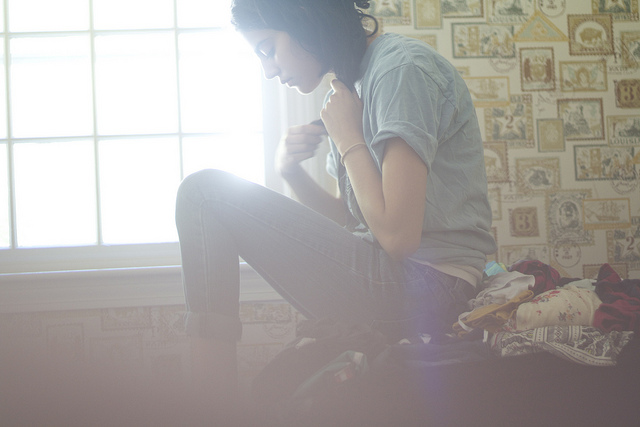
“Letting go gives us freedom, and freedom is the only condition for happiness. If, in our heart, we still cling to anything—anger, anxiety, or possessions—we cannot be free.” ~ Thich Nhat Hanh
~
Letting go is a lovely idea that brings up some not-so-lovely feelings in practice.
“Just let it go.”
We’ve all probably said and heard this countless times in all sorts of situations. I wonder how many times we can count when we’ve actually done it though—really and truly.
The parts of us that cling are deeply embedded. Our hands and hearts grasp tightly. Learning to relax our grip is a process most of us will come back to time and time again.
Nevermind letting go of experiences, of people, of heartache, grudges and emotional baggage that weighs us down, we struggle with the simple act of letting go of “stuff.”
I recently tried to have a wardrobe clear out. I’d been inspired by articles extolling the virtues of living simpler, having less stuff. It surprised me that I even needed to go through this process, because I’ve been through it dozens of times already. I thought I was pretty good at letting go, especially of possessions.
But while some are leaving behind everything they own and all that they know and carrying their children in their arms in search of a life of safety and freedom, I struggle with whether to put my bright green too-high suede heels in the charity bag.
I had some great nights out in those shoes and although I haven’t worn them in at least five years and my feet ache at just the thought of slipping my toes into them, there is some lingering thought that there may be a time in the future when they are the perfect shoes to wear.
What the hell is wrong with me?
When I left South Africa to come to the UK, I struggled to fit everything I thought I needed into 30 kg of luggage. Now I can’t even remember what I brought with me and I’m pretty sure I could have done with less. Nevertheless, I left behind quite a lot and that was my first step. The first time I really had to practice letting go of things.
I’d let go of one or two people—pretty ungraciously—before then. I’d just let go of a business I helped to build up and poured everything into for almost a year. So there was already lots of opportunity for practice, but it was still painful.
It stung.
Years later, the amount of “stuff” my husband and I had managed to accumulate wasn’t ludicrous—we were fairly good at living light. During those years I think we moved at least six times, so there was more opportunity for the practice of letting go. Even so, there were things that gathered around us.
When our first son was born we decided to move back to South Africa. We began the process of sorting through all of these things and creating “keep” and “leave” piles. We loaded the “keep” pile into a container to be shipped.
For the first three months in South Africa, we lived again out of our suitcases with only a small amount of stuff. We got on quite fine without it although when it all finally arrived, it was exciting to have it back. Something happened as we opened box after box. A re-attachment, a feeling of “oh yeah! I need this! How have I lived without it all this time?”
But we had. The needing was an imagined thing that seemed to arrive when the things did.
When we eventually moved into our own place, unpacking and arranging all of our things was a source of joy. We felt we had carefully selected everything to keep, we still felt like we were travelling light.
Then about a year after everything seemed to come together, it all fell apart again.
We decided the only way forward was to move back to the UK again. Suddenly all those things felt heavy once more.
Yet again, we loaded the accumulations of our life together so far into piles and boxes and packed them away. We could only take our bags back with us and this time we just left the rest behind. A few weeks later, all we had was each other and three suitcases to start over again with.
Somehow we got by without all of those things that we felt were so precious and we needed so much before. We let them all go again.
I began to feel as though this process was getting easier with practice.
But when I fell pregnant again, this need for “our stuff”—baby stuff specifically—returned. So we started the process of engaging with our things again. And the loaded feelings it brought up during skype discussions with family back home shocked me. I thought I had learnt not to be attached to these things. Clearly not.
I felt a hot knot inside—a burning drive to gather all of these things we had left behind—scattered between family members, lent and stored all over the place—pile it up, pack it away and send it on its way back to us.
What I realised with a little time and reflection was that it wasn’t necessarily the things themselves I was attached to. After all, I had gone without them for almost two years.
It was the associations and emotions that I attached to those things that I was having trouble letting go of.
Our hopes of rebuilding our lives in South Africa, near to our families, close to our roots, became associated with our things arriving there and us filling our new home with them. I realised then that this is why we struggle with attachment to possessions—because we’ve become emotionally involved with these things.
We’ve implanted our memories, our carefully constructed lives and identities in them. We collect things that are meaningful to us, that we feel reflect who we are and shape the space around us.
Our attachment to our possessions comes from our need to hold on. This is obvious. No revelation. But what are we holding on to? It’s not the things. If you’ve travelled light for any period in your life, no matter how brief, you will know the sense of freedom that comes from little “stuff.”
It’s not the “stuff” we really want to cleave to. It’s our ideas about ourselves and those we love, it’s our underlying desire to keep things as they are, to resist change.
We get attached to the memories and meanings we weave into things—and places too. Nostalgia is less of a feeling, and more of a tangible thing that sets up residence in our stuff.
It is important to love the spaces we create for ourselves and appreciate the things we have selected to be in that space—it’s partly what makes it home.
But if we can be mindful that our happiness and our true identity is not attached to these things then we can hold on to them with a lighter grip.
It’s not so much the green suede heels I’m battling to part with, it’s the part of me that once spent Friday nights drinking expensive cocktails in trendy Soho bars that I don’t want to admit is long departed. But whether I admit it to myself or not, whether I let go or not, I’ve already moved on anyway.
I have a new way of thinking about my “stuff” now, that seems to help me.
Instead of letting it go, I let it stay.
Because if we can be prepared to let everything stay as we move on, as we go, then perhaps it will feel a little less final. Because we are always moving, even when we think we are not, even when we lean back as hard as we can against the onward-motion which is life itself.
“Stuff” will always be there. The things that I actually need to carry with me should we have to go again are precious few. I’d carry even less now because my arms are already full.
But in our own ways we all keep moving. Movement is the nature of existence. It’s in everything.
There is no way we can stay even when we think we are. We may as well make the journey more comfortable by travelling light.
~
Author: Khara-Jade Warren
Image: kariiiiii/Flickr
~










Read 0 comments and reply